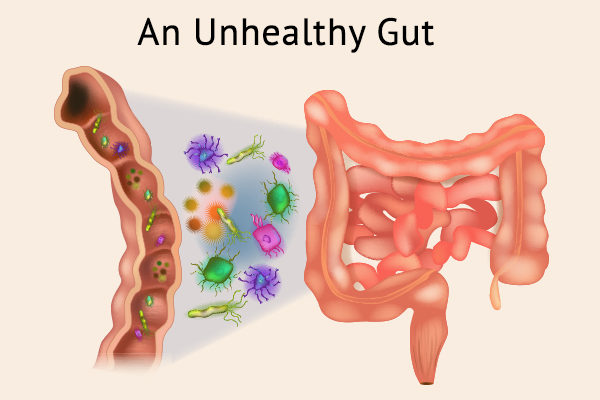In this article:
Maintaining a healthy digestive system is an incredibly important factor in supporting the immune system and the body as a whole.

The gut has good and bad bacteria that play a role in the health of the body. To have a healthy gut requires more good bacteria than bad bacteria. Conversely, an overgrowth of bad bacteria in the gut, causes dysbiosis and can lead to health complications. (1)
With 70% of the body’s immune system residing in the gut, it is critical to keep it functioning properly. Almost 90% of serotonin is made in the digestive tract, making it an essential part of maintaining a healthy mood. (1) Hence, a healthy gut is an important factor in achieving whole-body health.
Causes of an Unhealthy Gut

Some common causes of an unhealthy gut can be attributed to either everyday lifestyle factors or medical conditions/infection.
Infections/medical conditions:
- Fungal infection such as Candida overgrowth
- Small intestinal bacteria overgrowth (SIBO)
- Leaky gut
- Irritable bowel syndrome (IBS)
- Parasitic infection such as that of a pinworm
Lifestyle-related causes:
- Stress causes the body to go into a fight or flight mode, which can cause inflammation in the gut. (2)
- Intake of NSAIDs (nonsteroidal anti-inflammatory drugs) can cause issues related to the gut over time.
- Excessive sugar causes inflammation and feeds the harmful bacteria in the gut.
- Inflammatory foods, such as heavily processed oils (including canola oil, corn oil, and soybean oil), fried foods, high-fructose corn syrup, and artificial sweeteners, can cause inflammation in the gut and create imbalances that lead to an unhealthy gut.
- Glyphosate (Roundup) can decrease the number of beneficial bacteria in the gut.
- Excessive processed food consumption can cause inflammation in the gut and an imbalance of bacteria.
- Excessive alcohol can feed harmful bacteria in the gut and cause inflammation.
- Food intolerances can cause chronic inflammation in the body and weaken the gut lining, making the body more prone to illness. (3)
Symptoms of an Unhealthy Gut
Symptoms of gut imbalances will vary due to bio-individuality and lifestyle factors. Here are some symptoms that can be attributed to gut imbalances: (4)
- Bloating
- Constipation
- Indigestion
- Diarrhea
- Frequent upset stomach
- Fatigue
- Mood disorders
- Skin irritations
- Malabsorption
- Autoimmune conditions
- Constant fatigue
- Poor sleep quality
Diagnosing Gut Imbalances
A stool test is recommended to get to the root cause of an imbalanced gut. However, not all stool tests can provide all the information necessary to make a proper diagnosis.
A comprehensive stool test should be ordered to achieve a thorough analysis of gut health. (5)
Foods That Support a Healthy Gut

Consuming a healthy diet is one of the most important aspects of any program that aims at keeping gut healthy. (6) The following are easily available foods that help maintain a healthy gut:
- Bone broth (6) is incredibly healing to the gut lining due to its rich nutrient content and high bioavailability of nutrients. Bone broth is rich in amino acids, collagen, and compounds such as glutamine, glycine, and proline. These nutrients assist in healing the lining of the gut.
- Beef gelatin supports a healthy gut, and fruit gummies made with beef gelatin are an easy and tasty gut-supporting treat.
- High-fiber foods, such as legumes, beans, peas, oats, bananas, asparagus, artichokes, and leeks, are all wonderful foods for supporting a healthy gut. (7)
- High-quality probiotics are a wonderful addition to a healthy gut-supporting diet. The gut has billions of bacteria, both good and bad, and probiotics help to increase the beneficial gut bacteria. It is important to note that people who have dairy intolerance should opt for dairy-free probiotics. Food intolerances wear down the gut lining. (8)
- Consume probiotic-rich foods, such as fermented veggies, kefir, kimchi, yogurt without added sugars, and fermented drinks. (9)
- Consume prebiotic-rich foods, such as Jerusalem artichokes, garlic, leeks, asparagus, bananas, barley, oats, apples, flax seeds, seaweed, and apple cider vinegar. (10)
- Eat anti-inflammatory foods, such as turmeric, (11) ginger, green leafy veggies, and fresh fruits.
- Consume omega-3-rich foods, such as chia seeds, flax seeds, walnuts, coconut oil, and olive oil.
- Consume healthy fats, which include grass-fed butter, ghee, extra virgin olive oil, coconut oil, avocado oil, avocados, and chia seeds. (7)
- Drink adequate amounts of filtered water daily. Aim to drink 40–64 oz, depending on your height, weight, and level of activity. Water helps to flush toxins and supports a healthy gut.
Simple Tips to Maintain a Healthy Gut
Maintaining a healthy gut requires daily practices that take into consideration all diet and lifestyle factors. (12)
- Consuming a healthy diet rich in vitamins and minerals – This is a great way to support a healthy gut. Eating a wide range of colorful vegetables, fruits, clean proteins, healthy fats, and collagen-rich foods is a wonderful way to support gut health daily.
- Drinking plenty of filtered water
- Exercising
- Limiting alcohol consumption
- Quitting smoking
- Reducing stress
- Using non-toxic products
How Long Does It Take to Heal Your Gut?
There is no set duration to heal the gut as bio-individuality, diet, lifestyle, everyday lifestyle factors, and co-existing health issues all play a role. However, some gut imbalances can be improved in as little as 3 months and up to 2 years.
The first step to improve a gut imbalance is to get a comprehensive stool test to identify the imbalance. It is always important to know the type of gut imbalance to get to the root cause. Without identifying the exact type of imbalance, the incorrect diet, supplements, and protocol could make the symptoms worse.
Complications of an Untreated Imbalanced Gut

An unhealthy gut affects the body as a whole and can cause health complications, such as autoimmune conditions if left untreated. The long-term effects of an unhealthy gut will vary based on bio-individuality.
However, some gut imbalances can be attributed to poor absorption of vitamins and minerals, causing deficiency and leading to certain health complications. Also, an unhealthy gut can make the body vulnerable to illness and disease due to weakened immunity. The gut has tight junctions that seal the lining of the gut to prevent food particles, toxins, and foreign matter from entering the bloodstream and causing harm.
When the gut is not healthy and left untreated, the tight junctions can weaken, and food particles and foreign matter can easily enter the bloodstream, which can cause food intolerances, mood swings, and autoimmune conditions.
Final Word
In the words of the great Greek physician Hippocrates, “All disease begins in the gut.” These wise words have been the voice of reason for many practitioners to use the gut as a starting point in helping to improve their patients’ health.
When the gut is in a healthy state, the good bacteria assist the body in digesting and metabolizing foods, absorbing and utilizing nutrients, and maintaining a healthy mood.
On the other hand, an unhealthy gut, if left untreated, can decrease a person’s quality of life due to its connection to mood disorders and cognitive impairment. Thus, it is especially important to maintain a healthy gut for overall health and well-being.
- Was this article helpful?
- YES, THANKS!NOT REALLY


